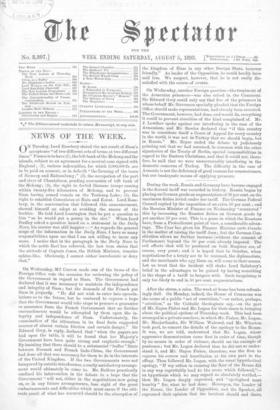On Wednesday, another Foreign question—the treatment of the Armenian prisoners—was
also raised in the Commons. Sir Edward Grey could only say that five of the prisoners in whose behalf Mr. Stevenson specially pleaded that the Foreign Office should make representations, had already been executed. The Government, however, had done, and would do, everything it could to prevent atrocities of the kind complained of. Mr. J. Lowther spoke against our interfering in the case of the Armenians, and Mr. Bowles declared that "if this country was to constitute itself a Court of Appeal for every country in the world, it was not in Turkey that we should begin, but in Russia." Mr. Bryce ended the debate by judiciously pointing out that we had assumed, in common with the other signatories of the Treaty of Berlin, special responsibilities in regard to the Eastern Christians, and that it could not, there- fore, be said that we were unwarrantably interfering in the domestic concerns of Turkey. The difficulty in the case of Armenia is not the deficiency of good reasons for remonstrance, but our inadequate means of applying pressure.


































